|
|
|
Sort Order |
|
|
|
Items / Page
|
|
|
|
|
|
|
| Srl | Item |
| 1 |
ID:
092499
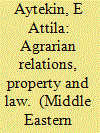

|
|
|
|
|
| Publication |
2009.
|
| Summary/Abstract |
Contrary to the prevalent tendencies of 'state-centrism' and legal formalism in the literature, this article studies the Ottoman Land Code of 1858 not as an initiator of trends but as a product of social change. The Code recognized private property on land, enlarged liberties of landholders, and pushed inheritance rules further towards gender equality. Deeply influenced by the uneven development of the capitalist relations of production, agrarian conflict, and the complex matrix of the interests of ruling groups, Ottoman land law in the nineteenth century unmistakably evolved in the direction of modern law based on the abstract individual and full commodification of land.
|
|
|
|
|
|
|
|
|
|
|
|
|
|
|
|
| 2 |
ID:
106128
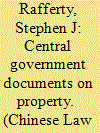

|
|
|
| 3 |
ID:
077444
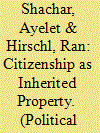

|
|
|
|
|
| Publication |
2007.
|
| Summary/Abstract |
The global distributive implications of automatically allocating political membership according to territoriality (jus soli) and parentage (jus sanguinis) principles have largely escaped critical scrutiny. This article begins to address this considerable gap. Securing membership status in a given state or region- with its specific level of wealth, degree of stability, and human rights record- is a crucial factor in the determination of life chances. However, birthright entitlements still dominate both our imagination and our laws in the allotment of political membership to a given state. In this article we explore the striking conceptual and legal similarities between intergenerational transfers of citizenship and property. The analogy between inherited citizenship and the intergenerational transfer of property allows us to use existing qualifications found in the realm of inheritance as a model for imposing restrictions on the unlimited and perpetual transmission of membership-with the aim of ameliorating its most glaring opportunity inequalities
|
|
|
|
|
|
|
|
|
|
|
|
|
|
|
|
| 4 |
ID:
188227
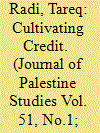

|
|
|
|
|
| Summary/Abstract |
Since 2007, the Palestinian Authority has implemented a strategy of financialized urbanization in response to economic crises precipitated by Israel’s settler-colonial stranglehold on the Palestinian economy. This article argues that financialized urbanization operates as a mechanism to expand the local banking sector and as a modality of settler-colonial alienation. Examining the joint-ownership structures of companies whose activities straddle real estate and financial markets, the article shows where land ownership in the West Bank ultimately lies. The study highlights qualitative changes in money lending and the extended reach of finance to emphasize the risks of financial collapse. Understanding finance capital and settler colonialism as systems predicated on managing risk for maximum returns, the discussion draws their relation to each other into a single analytical framework to center the question of land dispossession and racialization at the heart of financialized urbanization.
|
|
|
|
|
|
|
|
|
|
|
|
|
|
|
|
| 5 |
ID:
125053
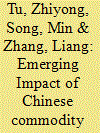

|
|
|
|
|
| Publication |
2013.
|
| Summary/Abstract |
In this paper we construct a set of indices that capture the special features of the Chinese commodity futures market for the period from January 2000 to December 2011 to analyze the general properties of China's commodity futures market. Using these indices we investigate the risk premiums of Chinese commodity futures and verify that the commodity futures can act as an effective diversification tool for Chinese asset management. It is found that the commodity futures can hedge both expected and unexpected inflation in China, and agricultural commodity futures are found to signal inflation 2 months beforehand. Finally, we explore the relationship between Chinese and US commodity futures markets in the years 2000 and 2010, and find that their interactions strengthen over time. Our research reveals an increasingly important role of the Chinese commodity futures market in both the domestic and the global economy. Some policy changes are suggested in response to this trend.
|
|
|
|
|
|
|
|
|
|
|
|
|
|
|
|
| 6 |
ID:
173414
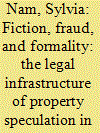

|
|
|
|
|
| Summary/Abstract |
Through the standardization of property as a commodity, real estate speculation in Phnom Penh has flourished and has included foreigners, for whom Cambodian real estate property is constitutionally off-limits. This essay outlines some features of Cambodian law to highlight the contours of the country’s deep legal pluralism, as well as to describe how law is part of the way property has been remade as a market commodity. “Legal fictions” – technical devices and shell companies – give access to Phnom Penh’s real estate market. The use of legal fictions in Cambodia’s economy is widespread and, crucially, structures property ownership and its distribution. In the process these devices work to veil ownership in plain sight and skew access to property to those who can utilize this effectively.
|
|
|
|
|
|
|
|
|
|
|
|
|
|
|
|
| 7 |
ID:
120630
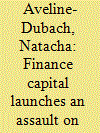

|
|
|
|
|
| Publication |
2013.
|
| Summary/Abstract |
Over the past two decades, global market finance has taken root in China to seek property investment. This article examines the spatialities and anchorage methods of finance capital within Chinese national territory. It highlights the spatial and sectoral differences in the composition of property portfolios as a function of the return/risk coupling. These differences are exacerbated by a split in the geographical origin of the funds, which determines differentiated conditions of access to land and management of the investment time horizon of the assets portfolios. The penetration of finance capital into urban space tends to increase the fragmentation and functional specialisation of districts, a phenomenon fostered by entrepreneurial urban policies. As a result, urban projects are becoming standardised in terms of both design and program. They are increasingly governed by external references that favour the expansion of multinationals and transform lifestyles and consumer habits.
|
|
|
|
|
|
|
|
|
|
|
|
|
|
|
|
| 8 |
ID:
190731
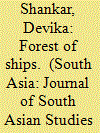

|
|
|
|
|
| Summary/Abstract |
This paper examines how the annexation of Malabar by the English East India Company in the last decade of the eighteenth century allowed the colonial administration to experiment with novel forms of state control in the region’s forests. At the same time, through a focus on the connections forged between Malabar’s forests and Bombay’s dockyards, this paper will use archival sources to examine the crucial role played by the timber monopoly introduced in 1806 in dislodging Malabar and its ports from their central position in the Indian Ocean economy and facilitating their incorporation into the margins of the emerging colonial economy.
|
|
|
|
|
|
|
|
|
|
|
|
|
|
|
|
| 9 |
ID:
140361
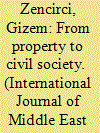

|
|
|
|
|
| Summary/Abstract |
In this article, I argue that shifting development discourses have shaped the meaning and function of vakıfs (religious endowments) in Turkey since the establishment of the republic in 1923. I identify three periods defined by their distinctive development discourse, and show how each of these discourses made vakıfs into both an object and a site of development. In the etatist discourse of the 1930s, vakıfs were articulated as national treasures tasked with financing state-led economic development. With the shift to a mixed economy discourse in the 1960s, vakıfs were reconfigured as private philanthropic foundations expected to create a skilled labor force. The neoliberal development discourse of the 1980s transformed vakıfs into welfare organizations focused on poverty. This article shows that in all three of these periods, the relationship between state, Islam, economy, and society was articulated, legitimized, and consolidated with reference to a seemingly stagnant but in fact malleable institution inherited from the Ottoman Empire—the vakıf. I refer to this process as the “local production of development,” a conceptualization emphasizing how global discourses of development are formed and transformed at the local level.
|
|
|
|
|
|
|
|
|
|
|
|
|
|
|
|
| 10 |
ID:
067398
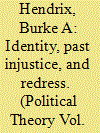

|
|
|
| 11 |
ID:
155524
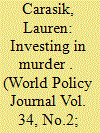

|
|
|
|
|
| Summary/Abstract |
Lawyer Lauren Carasik argues that the World Bank’s private-lending arm, the International Finance Corporation, has stoked a bloody land dispute in Honduras by funding the oligarch-owned agribusiness behind the violence. Now, with Carasik’s help, the Honduran farmers are taking the World Bank Group to U.S. federal court.
|
|
|
|
|
|
|
|
|
|
|
|
|
|
|
|
| 12 |
ID:
107948


|
|
|
|
|
| Publication |
2011.
|
| Summary/Abstract |
What, if any, is the problem with treating bodies as objects or property? Is there a defensible basis for seeing bodies as different from "other" material resources? Or is thinking the body special a kind of sentimentalism that blocks clear thinking about matters such as prostitution, surrogate motherhood, and the sale of spare kidneys? I argue that the language we use does matter, and that thinking of the body as property encourages a self/body dualism that obscures the power relations involved in all contracts that cedes authority over the body. Recognising the self as embodied, however, also makes it harder to insist on sharp distinctions between activities that involve the body and those that "just" involve the mind, hence harder to justify refusing payment for explicitly body services while condoning it for those to which the body is more incidental. I therefore provide a modest defence of monetary compensation for those who "donate" bodily products or services. Compensation does not, however, mean markets for there is at least one sense in which the body is special. This is that more so, and more intrinsically than other markets, markets in body parts or bodily services depend on inequality. I use this to make a case against such markets.
|
|
|
|
|
|
|
|
|
|
|
|
|
|
|
|
| 13 |
ID:
140969
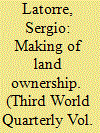

|
|
|
|
|
| Summary/Abstract |
Hernando de Soto’s best-selling book The Mystery of Capital argues that economically disadvantaged countries lack institutional arrangements that can spur economic development and capital growth. This article questions de Soto’s institutional economist account. It draws on a 14-month ethnographic study performed at two rural field sites in Colombia and in the central government office responsible for promoting land programmes designed to improve the living conditions of rural communities. This study, which focuses on the daily practices of public officials and rural campesinos, suggests the importance of the title document, and in particular the public deed, for land ownership. It describes the process by which landownership is created by the issuance of the land title document and highlights some important elements and untended consequences that are often neglected in this process of making land a legal and economic asset.
|
|
|
|
|
|
|
|
|
|
|
|
|
|
|
|
| 14 |
ID:
186146
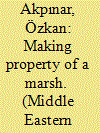

|
|
|
|
|
| Summary/Abstract |
This article discusses the contested character of property rights with respect to reclaimed land from marshes in the Ottoman Empire through the reclamation project for Lake Lapsista in Ottoman Ioannina starting from 1886. By the end of the nineteenth century, many marshes, lakes, and rivers in the Ottoman territories were planned to be cleaned and reclaimed for various purposes. However, as a result of reclamation projects, the possession of reclaimed land, and the way such lands were defined, became a vexed issue in which various actors became involved and struggled over controlling them. Focusing on struggles and negotiations the reclamation project created, the article aims to uncover how the ownership of reclaimed marshy regions were defined at the local level. Drawing on archival materials on the land dispute over the reclaimed Lake Lapsista from 1886 to 1909, the article shows that the struggle over control of the reclaimed land manifested itself in the attempts of both central and local actors to circumvent legal boundaries or manipulate legal regulation and codes at the local level, challenging approaches that only focus on legal texts and codes.
|
|
|
|
|
|
|
|
|
|
|
|
|
|
|
|
| 15 |
ID:
144759
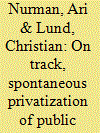

|
|
|
|
|
| Summary/Abstract |
The history of land control in Indonesia is overwhelmingly one of colonial conquest, government enclosure and expropriation of traditional property rights. However, beneath these great transformations, counter-currents also flow. Encroachment on state land and its gradual privatization by ordinary people sometimes gnaw at government property. Through a series of small, sometimes innocuous actions, people manage to undo the previous ownership regime. This article shows how settlers over a period of some 30 years – through a strategic mixture of civic disobedience and civic compliance – managed to appropriate, formalize and effectively privatize land belonging to the stateowned railway company in the city of Bandung. The authors argue that disobedient occupation and subsequent obedient payment of taxes, documentation of residence and 'normalization' of the area have reduced the company's ownership to thin formality, whereas new residents hold all the substantial elements of property rights to the land.
|
|
|
|
|
|
|
|
|
|
|
|
|
|
|
|
| 16 |
ID:
126872
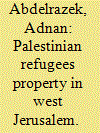

|
|
|
|
|
| Publication |
2011.
|
| Summary/Abstract |
The article presents the author's views regarding the Palestinian property claims issue in West Jerusalem. The author points the challenges faced by several Palestinian Arabs in claiming their properties in the mentioned city due to the Israeli government's control. The author notes the move of the United Nations General Assembly (UNGA) in aiding these people to claim their rights. The legality issue of claiming their properties is also noted.
|
|
|
|
|
|
|
|
|
|
|
|
|
|
|
|
| 17 |
ID:
101440
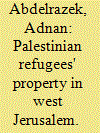

|
|
|
| 18 |
ID:
153019
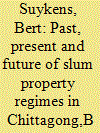

|
|
|
|
|
| Summary/Abstract |
This article argues for the need to take time into account when understanding land ownership in slums. It shows that this allows comprehending more accurately the place of land law and the specific forms that legal struggles over land take. Field research in a slum in Chittagong (in Bangladesh) reveals that while contemporary practices of ownership and transfer might appear to be informal and illegal, they are not only grounded in historical forms of legal land settlement, embedded in a long-standing court battle over legal ownership, but also the product of expectations related to the (legalised) future. Finally, urban planning, with a state-sponsored vision of the future of slums, further complicates the role of the law.
|
|
|
|
|
|
|
|
|
|
|
|
|
|
|
|
| 19 |
ID:
076460
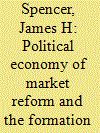

|
|
|
| 20 |
ID:
106554
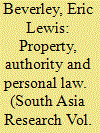

|
|
|
|
|
| Publication |
2011.
|
| Summary/Abstract |
British rule in South Asia transformed the economy and society of the subcontinent, in large part by revamping the status of landed property. Colonial law was founded on the notion that ostensibly religious personal law was outside state jurisdiction. The boundary between state law and personal law, however, was blurry and some elements of 'religious' law had major implications for matters at the core of colonial policy, such as property control. This ambivalence produced a scenario in which legal debates became authorised spaces for colonial subjects to pursue their agendas.
Taking the Muslim charitable trust, or waqf, in late colonial British India, this article argues that advocacy of substantive and procedural changes in waqf laws by Muslim legal activists repre-sented a pointed critique of colonial policies. Through a brief history of the articulation between charitable trusts and colonial property policies, the article draws from the work of two late colo-nial Muslim judges, Syed Ameer Ali and Faiz Badrudin Tyabji, to demonstrate the role waqf debates played in refashioning colonial legal culture. It is suggested that claims about waqf were both instrumental attempts to advance claims to property, and instances for articulating broader ideological critiques of the interpretative authority of British judges.
|
|
|
|
|
|
|
|
|
|
|
|
|
|
|
|
|
|
|
|
|